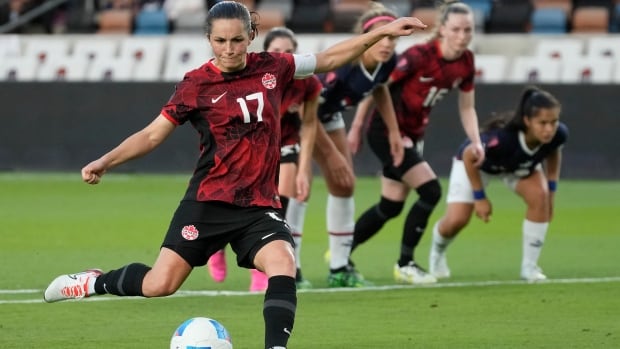Greater than 100 worldwide ladies’s soccer gamers are calling on FIFA to rethink its sponsorship by Saudi Arabian oil firm Saudi Aramco, which is majority state-owned, in an open letter to FIFA’s president.
Calling it a “center finger to ladies’s soccer,” the 106 gamers who signed the letter say Saudi Arabia’s human rights violations, significantly towards ladies and members of the 2SLGBTQ+ group, go towards the game’s values of equality and inclusion.
The athletes’ letter, despatched to CBC Information upfront of its official launch, emphasizes that homosexual gamers, “a lot of whom are heroes of our sport,” are significantly susceptible to persecution in Saudi Arabia, the place homosexuality is taken into account a criminal offense.
The gamers additionally elevate considerations in regards to the oil firm’s environmental impression.
Saudi Aramco is the most important oil producer on the earth. It’s 98.5 per cent owned by Saudi Arabia.
FIFA’s take care of Saudi Aramco, introduced in April, lasts till 2027. It contains sponsorship of each the women and men’s World Cups in 2026 and 2027.
FIFA’s different main companions embody corporations comparable to Adidas, Coca-Cola and Visa.
In response to the letter, FIFA mentioned it stands by the sponsorship.
“FIFA values its partnership with Aramco and its many different business and rights companions,” the group despatched in a press release.
Saudi Aramco has not but responded to requests for remark from CBC Information.
Sponsorship is ‘absurd’
Among the many signatories are present Crew Canada captain Jessie Fleming and former Crew Canada goaltender Erin McLeod.
“[Saudi Arabia] has the 2034 World Cup bid and considering of somebody like myself, even travelling to go watch these video games wouldn’t be an possibility,” McLeod instructed CBC Information.

McLeod, who’s overtly homosexual, is married to Icelandic soccer participant Gunny Jónsdóttir. The couple simply welcomed a new child into the household.
“I feel it comes again to FIFA being an especially highly effective group. What duty have they got to uphold what they’ve mentioned? They’ve mentioned very publicly the place they stand on human rights,” McLeod mentioned.
Danish nationwide crew participant Sofie Junge Pedersen, one of many letter’s three primary signatories, reached out to ladies soccer gamers world wide in regards to the concern.
“We expect that it is fairly absurd that we, as feminine soccer gamers, are requested to advertise on our shirt, Saudi Aramco as a sponsor,” Junge Pedersen instructed CBC Information.
“The human rights violation there, the discrimination towards ladies that the Saudi authorities stand for,” she mentioned from her house in Milan, the place she at the moment performs for Inter Milan.
“It is simply absurd and really stunning for me that we’re requested to try this when these are usually not our values and in addition not FIFA’s personal values.”
Justify sponsorship, gamers ask FIFA
Within the open letter, the signatories ask FIFA to drop the sponsorship and clarify how the governing physique can justify its preliminary determination to signal the deal.
“In taking Aramco’s sponsorship, FIFA is selecting cash over ladies’s security and the security of the planet and that is one thing we as gamers are standing towards, collectively,” present Crew Canada Jessie Fleming writes.
The third concern for the gamers is the impression of Saudi Aramco on the setting.
Within the letter, the gamers write: “This sponsorship is way worse than an personal purpose for soccer: FIFA may as properly pour oil on the pitch and set it alight.”
The gamers are additionally asking FIFA to reply to their request to create a evaluation committee with participant illustration regarding sponsorship selections.
FIFA didn’t reply to these calls for, as a substitute noting “sponsorship revenues generated by FIFA are reinvested again into the sport in any respect ranges and funding in ladies’s soccer continues to extend.”
The soccer group says on its web site that it’s “dedicated to respecting all internationally acknowledged human rights and shall attempt to advertise the safety of those rights.”









